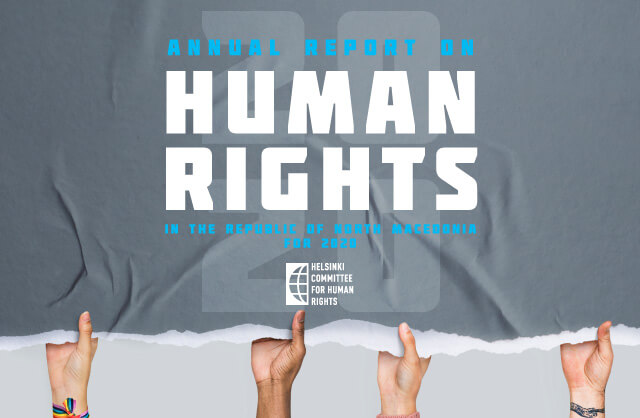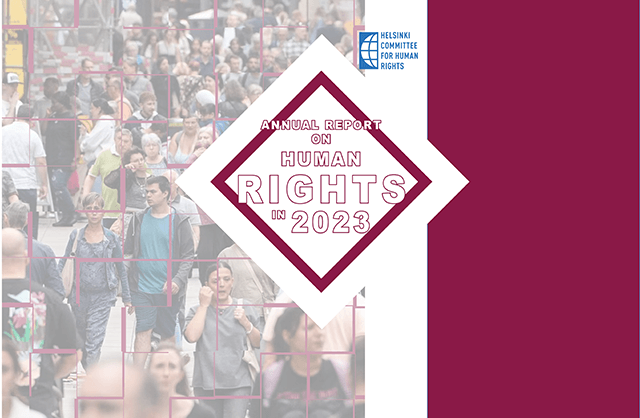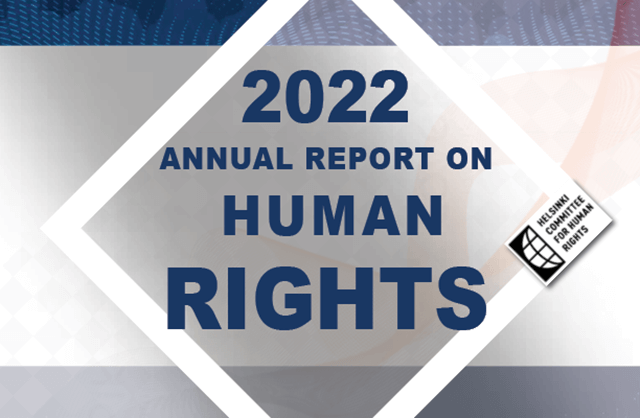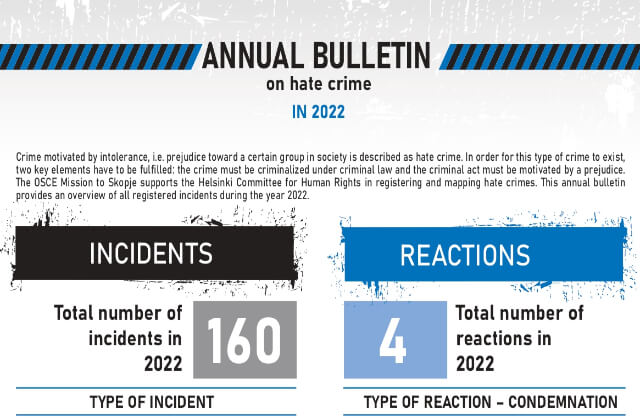Annual report on human rights in 2020
December 31, 2020

The global health crisis of 2020 has put the world in a state of uncertainty and fear, with numerous social and economic consequences. The measures to protect public health and the efforts to prevent the spread of the coronavirus inevitably took precedence over the rights and freedoms of citizens. The declaration of quarantines and curfews also meant a direct violation of basic human rights, such as free movement. However, given the speed with which the COVID-19 pandemic took hold and the many mysteries associated with its nature, these restrictions were widely accepted as a “necessary evil”. A more in-depth analysis of the effects of the global crisis on the human rights situation is yet to be made, given the profound implications of the crisis on political and economic constellations within and between countries. But the conclusion remains, which emerged in the first months of the crisis – that the poorer and marginalized people were and still are disproportionately more affected by the crisis. This is shown by the record number of requests for free legal aid submitted to the Helsinki Committee during the pandemic 2020.
Gross violations of workers’ rights began immediately after the declaration of the state of emergency, and some companies began firing employees before the real effects of the crisis were felt. Most of the cases reported to the Committee concerned the termination of employment contracts, forced settlement for termination of contracts, illegal non-extension of fixed-term contracts and reduction and non-payment of salaries. The government measures to prevent and protect against the coronavirus were often violated, and the female textile workers were among the most at risk due to inadequate working conditions and transportation to work.
The crisis did not lack the profiteering of private health care institutions, but also other forms of abuse of the crisis. Cases of illegal profiting from budget aid were noted during the implementation of the anti-crisis package of measures of the Government of the RNM, despite numerous appeals that the purpose of the state financial support should be the preservation of jobs.
Regarding the changes in the labour legislation, although the new Labour Relations Law started to be drafted in the first half of 2018, it did not enter the parliamentary procedure in 2020 as well. In December, the new text of the Law on Prevention and Protection against Violence against Women and Domestic Violence re-entered the parliamentary procedure but was not passed by the end of the year. However, the Law on Prevention and Protection against Discrimination was finally adopted, after a laborious process and numerous obstacles, which mostly affected those who need to be protected by the regulations. The Commission for Prevention and Protection against Discrimination, as a protection mechanism, was inaccessible to the citizens from August 2019 and throughout 2020, which reduced the effective protection against discrimination.
During 2020, the Helsinki Committee continued to monitor the reforms and the work of the judiciary as an active member of the Blueprint Group. Regarding the overall procedures for adopting new legal solutions, the process of adopting some of the laws was assessed as transparent and inclusive, which contributes to increasing the trust of citizens in judicial institutions, but in some of the laws, the procedure and the process of adoption of the new legal solutions were not positively assessed. In most of the laws from the Strategy for Reform of the Judicial Sector (2017-2022) that were adopted and entered into force in the past period, the implementation of legal solutions in practice is assessed as correct and timely. The Ministry of Justice also undertook significant activities in order to promote the Law on Free Legal Aid and to increase the information of the citizens. However, there are remarks in the process of implementation of the Law on Public Prosecution, the Law on Administrative Disputes, the Law on the Judicial Council of the RSM, as well as parts of the Law on Free Legal Aid.
On 25 March 2020, the Council of the European Union, based on the recommendations of the European Commission, unconditionally made a political decision to start negotiations for membership of the Republic of North Macedonia in the European Union. At the same time, the European Commission started preparing the negotiating framework in the shortest possible time in accordance with the new negotiation methodology. This reaffirmed the importance of Chapter 23 – Judiciary and Fundamental Rights as a key basis for the progress of the negotiations, as well as its impact on the overall accession process. Therefore, monitoring CSOs’ progress in Chapter 23 is essential. Taking this into account and following the developments, the Helsinki Committee appealed human rights to be respected by timely and transparently informing the public with accurate information in order to increase public oversight of the executive during the state of emergency.
Despite the efforts of the German Presidency and the intensive negotiations between the delegations from the Republic of North Macedonia and the Republic of Bulgaria, on 16 November the Council of the European Union did not reach unanimity for the start of negotiations and the first intergovernmental conference in December. Although Bulgaria insisted on including its demands in the negotiating framework, other member states unanimously rejected the request. The European Union, represented by the German Presidency, stressed that bilateral issues should be kept out of the negotiating framework.
On a political plan, the debate over the early parliamentary elections on 15 July also dominated. Through their observation mission, OSCE/ODIHR preliminary findings noted that the elections were generally conducted effectively, despite the pandemic response adjustments, but that legal stability was hindered by substantial revisions of the Electoral Code and subsequent ad hoc regulation adopted during the state of emergency. The campaign, although with a negative tone, was really competitive and the participants were able to convey their messages despite the limitations of the usual communication.
In a year when negative trends in many areas of human life have dominated, we are witnessing two positive results in international advocacy – the verdict for the little Leon, whose case set a precedent for accepting an application on behalf of a minor with a disability, without being able to give consent to be represented before the European Court of Human Rights. The second success is the complaint from last year submitted by the Helsinki Committee to the CEDAW Committee,1 which found injustice and made recommendations to the state for structural changes and eradication of harmful practices in accessing gynaecological services for Roma women. The multiple systematic discrimination of the Roma in North Macedonia in 2020 was manifested through the cases of police brutality against members of this community, as well as the lack of access to clean water, sanitary materials, and health care during a pandemic.
The closure of day care centres, unadopted distance learning, as well as the impossibility of social distance for people dependent on support in their daily life, are just some of the challenges people with disabilities face. The only mitigating circumstance for them was the exclusion from decisions that prevent movement, as well as government decisions to reduce administrative procedures.
The Sanctions Enforcement Administration has generally dealt well with the pandemic caused by COVID-19. In the summer, during a period of loosened restrictive measures, the Helsinki Committee for Human Rights and the Macedonian Young Lawyers Association conducted field visits to monitor the situation in all penitentiaries and correctional facilities. In addition to the regular challenges faced by these institutions, the teams also documented the state of health care and the rights of the convicts which should be applicable to them during a pandemic.
1 The Committee on the Elimination of Discrimination against Women is a body of independent UN experts that oversees the implementation of the Convention on the Elimination of All Forms of Discrimination against Women.
The series of restrictive measures that affected the entire population, including the recommendations for self- isolation, seriously increased the risk of violent behaviour in the home. These preconditions for domestic violence are followed by the stress caused by the uncertain existence and the difficult daily life of people. The home is not safe for many women, but also for many LGBTI people who have been forced to live in a homophobic and violent environment due to limited mobility. From the dangers of endangered mental health to the heteronormativity of certain virus prevention measures, this has undoubtedly been a difficult year for the LGBTI community as well.
The stress of endangered existence, the closure of kindergartens, schools, and other institutions and public facilities, the uncertain future – strongly affected the physical and mental health of citizens and shifted the collective dynamics in society. All this was reflected in the public communication, with an intensified negative charge, especially on social networks. In 2020, we registered a 130% increase in hate speech reports compared to the previous year. Still, most of the hatred is based on ethnic grounds, followed by political affiliation and sexual orientation. The crisis, unfortunately, has imposed a new basis for hate speech – the state of health. Regarding our reports of hate speech, the necessary response from the competent institutions, especially from the Public Prosecutor’s Office, is still missing. Such inadmissible attitude of the prosecution bodies was noticed in the “Public Room” case, which was revealed in the first months of 2020, and after which the prosecution did not act until the end of the year. Impunity left open the possibility of a recurrence of such cases of abuse and sexual harassment of women and girls.
Rooted social segregations in societies manifested themselves from the very beginning of dealing with the pandemic. Not only class divisions, but gender, sexuality, and even age ones. And the evasion of the mechanisms of international solidarity in the distribution of vaccines, which was felt at the end of the year, indicated the uncertain further course of the fight against the global danger and the widening of the gap between the powerful and the powerless and globally. 2021 will undoubtedly be a year of prolonged fight against the coronavirus. We can only hope that it will bring recovery of people and communities, but also a rethinking of the priorities of humanity.


